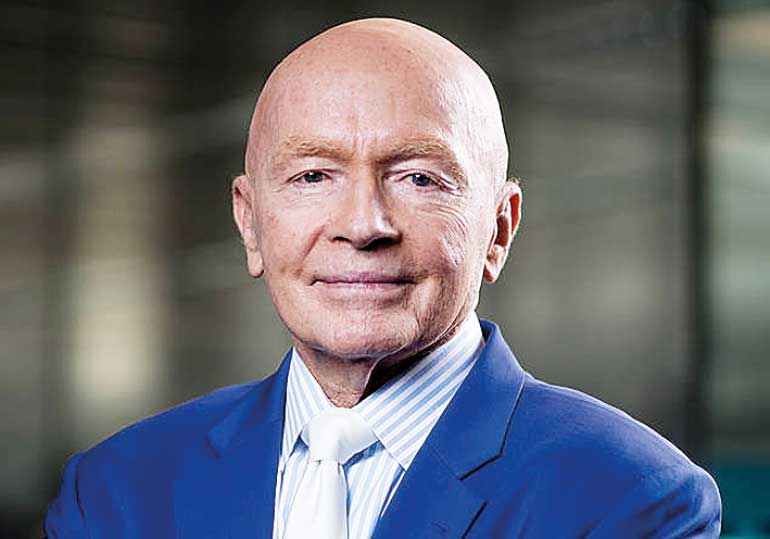Monday Feb 23, 2026
Monday Feb 23, 2026
Tuesday, 7 June 2022 03:59 - - {{hitsCtrl.values.hits}}

Emerging markets guru Mark Mobius
Emerging markets guru Mark Mobius has expressed optimism of Sri Lanka coming out of its worst crisis as well as confidence that his investment in an apartment at Cinnamon Life will appreciate in the long term.
Mobius revealed this and few other interesting observations during a webinar titled “The dynamics of distress and debt in emerging markets: Sri Lanka›s struggling economy» last week by the Cornell University, a private Ivy League and statutory land-grant research university, based in Ithaca, New York.
The virtual roundtable with a panel of experts from the World Bank and Cornell University, examined the origins of the Sri Lankan debt crisis and analysed the economic and political patterns that are leading the country toward a challenging and uncertain future.
Mobius said he visited Sri Lanka recently to collect the keys to his apartment at John Keells Holdings’ Cinnamon Life and also toured the south for a holiday.
He has been visiting and investing in Sri Lanka via Franklin Templeton Investments and Templeton Emerging Markets Group where he served for over 30 years. “It›s (Sri Lanka) just an incredible place. I really love going there,” Mobius he told the virtual event adding that he also witnessed the peaceful anti-government protest at Gogotagama in Colombo.
“The big question is why was I going to Sri Lanka at that time. Well the reason is that four years ago I purchased an apartment and a new development that was being built by JKH,” Mobius said referring to the Cinnamon Life and added “I was there to get the keys to my apartment.”
“Of course if you look at it from the outside and say what a foolish thing aren›t you going to be losing your shirt there. No, because property prices actually are going up in Sri Lanka because those people with money want to turn it into assets of some way. So I›m very comfortable with having a property asset because I know I›m not going to lose a lot of money and probably there›ll be some appreciation in value,” Mobius added.
He also expressed his belief that support will be given to Sri Lanka under the right conditions. “Of course there have to be political changes but I believe that there will be considerable amount of support and in the context of global debt the amounts that we›re talking about are not large. So I›m quite optimistic of what›s happening but we still have to go through a lot of pain,” Mobius added.
“I believe that within the next two or three years they will be on their feet again provided that there›s some political change taking place and provided that the donors the people who come to the table for more debt will be generous and aggressive in giving Sri Lanka the kind of help that they need,” said Mobius whose current venture Mobius Capital Partners does active investment approach with an emphasis on improving governance standards in emerging and frontier market.
Mobius also expressed confidence in tourism bouncing back. “End of the day it›s all about tourism because tourism is the big foreign exchange earner and I believe turning around the tourism will be rather quick because nowadays with the rupee having declined so dramatically against the US dollar it›ll be very inexpensive to visit Sri Lanka and they have wonderful hospitality.”
During the webinar he also spoke on Sri Lanka’s strategic location and opportunities via the Colombo Port city.
He also said Sri Lanka suffering from twin deficits - in the government finances and the foreign exchange and President Gotabaya Rajapaksa-regime’s reduction in taxes and banning import of fertiliser were costly mistakes.